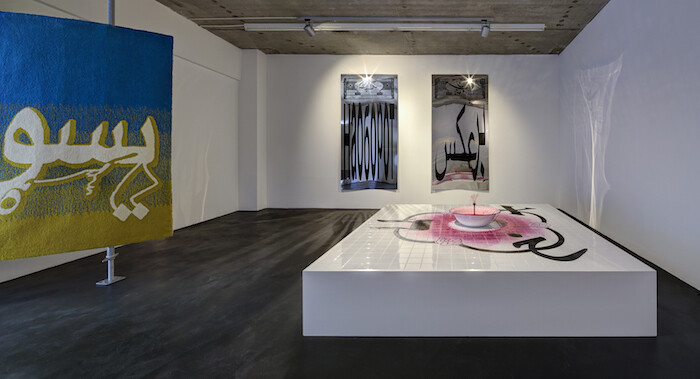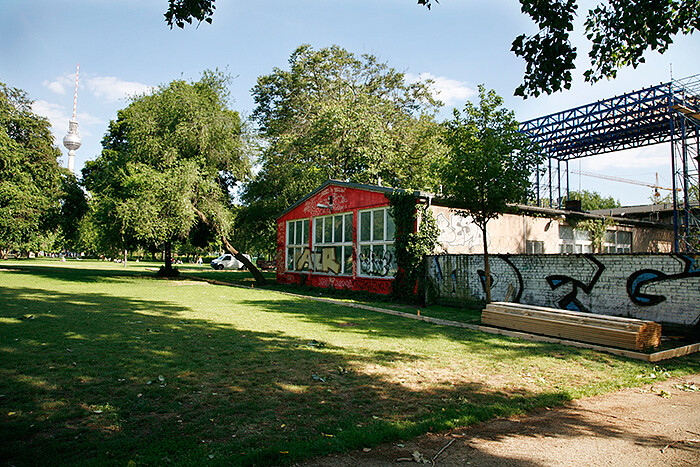Categories
Subjects
Authors
Artists
Venues
Locations
Calendar
Filter
Done
February 28, 2024 – Review
Tania Bruguera’s “Where Your Ideas Become Civic Actions (100 Hours Reading The Origins of Totalitarianism)”
Eugene Yiu Nam Cheung

In Germany’s increasingly censorious intellectual climate, Berlin’s Hamburger Bahnhof staged the Cuban artist Tania Bruguera’s “Where Your Ideas Become Civic Actions (100 Hours Reading The Origins of Totalitarianism)” inside its main hall. This participatory public reading of—and discussion around—Hannah Arendt’s The Origins of Totalitarianism (1951) was spread across four days, featuring the artist alongside writers such as Masha Gessen and Deborah Feldman, prominent artists in Berlin including Candice Breitz, and people from “the museum’s neighborhood.”
Speakers—mostly solo, sometimes in a trio, and even as a chorus—addressed the audience amid a spare scenography: a single rattan-upholstered rocking chair, illuminated from above by a beam of golden light. Hospital-gray bean bags and cardboard stools were strewn before it, stretching out towards the entrance of the museum and luring visitors into a collectivized consideration of “power and violence, plurality and morality, politics and truth.”
Microphones were connected to a sound system scattered haphazardly around the space, and synchronized with speakers outside the institution facing Invalidenstraße, a thoroughfare leading to Berlin’s central station, a few hundred meters away. Like the work’s title, Bruguera’s sonic gesture felt prescriptive—as if it were the artist’s duty to break Arendt out of the institution and onto the …
November 9, 2015 – Review
Slavs and Tatars’ “Dschinn and Dschuice”
Ana Ofak

On the occasion of their nomination for the Preis der Nationalgalerie in 2015, Slavs and Tatars’ work can presently be viewed at two locations in Berlin. One is the Hamburger Bahnhof, the institution hosting the prize. There, books by the art collective are offered up for viewing in what looks like a swingers’ club for bookworms. By now, Slavs and Tatars have published ten books, making these the heart of their production. The other exhibition is at Kraupa-Tuskany Zeidler. Although the gallery show lacks the legs that lure and the dangling swings of the Hamburger Bahnhof presentation, it is far more daring. Together, the two sites unlock the universe of holistic heuristics Slavs and Tatars have been constructing for almost a decade. In this universe, the veils of obscurity that fell over the Eurasian territory, covering it in a neoliberal economy of uniform individualism, are lifted.
Slavs and Tatars are supreme wordsmiths. Hardly another letter in the pool of Slavic languages of Eurasia requires so much artistry in articulation or, for that matter, causes so much transcription trouble in the West as the Dž or Dż [d͡z] in the exhibition’s title. But “Dschinn and Dschuice” does not simply poke fun at …
June 11, 2011 – Review
"based in Berlin"
Michèle Faguet

As the debate over the alleged mishandling of the mysterious E. coli outbreak in Germany raged on in the local and international press, Berliners had their own little controversy to distract themselves with: the opening of the mega-exhibition “based in Berlin,” warily anticipated (and even boycotted) by many members of the local art community distrustful of the motives behind the project’s conception. First presented in October 2010 as a Leistungsschau (showcase) of the much-touted contemporary art scene in Berlin, this survey exhibition was headed up by Christine Macel, Hans Ulrich Obrist, and Klaus Biesenbach as the first step in a long-term initiative to eventually establish a permanent Kunsthalle in Berlin—a decades old issue that has become a significant part of the political agenda of Mayor Klaus Wowereit (of “poor but sexy” fame).
Protests were quick to follow the open-call for artists in Berlin to submit their portfolios, and soon thereafter a group of young “under-curators” (Angelique Campens, Fredi Fischli, Magdalena Magiera, Jakob Schillinger, Scott Cameron Weaver) were appointed to run around town doing the dirty footwork, hopping from studio to studio in a huff-and-puff attempt to get this (vaguely defined) show off the ground. A series of heated discussions hosted by …